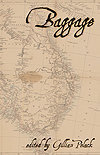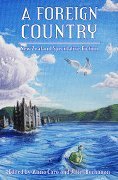Picking Up Post Threads 1: "Baggage"
We have been having a few conversations on the blog recently and so I thought it might be good to bounce a few of the threads out of "comments" and back into "posts."
 Last Saturday, I posted on the Australian short story collection Baggage, edited by Gillian Polack and published by Eneit Press. You can read the full post here, but the short version is that I very much enjoyed Baggage. Also, since it is both Australian and short fiction, reading it turned my mind back to another recent post, in which I ruminated on whether there is a form of speculative fiction that is distinctively New Zealand in character. (To 'en-ruminate', click here.) A key observation from last Saturday's post, however, may have been:
Last Saturday, I posted on the Australian short story collection Baggage, edited by Gillian Polack and published by Eneit Press. You can read the full post here, but the short version is that I very much enjoyed Baggage. Also, since it is both Australian and short fiction, reading it turned my mind back to another recent post, in which I ruminated on whether there is a form of speculative fiction that is distinctively New Zealand in character. (To 'en-ruminate', click here.) A key observation from last Saturday's post, however, may have been:
 " Recently I discussed … how the themes of environmental dystopia and to a lesser, but still noticeable, extent reproductive scifi, occurred within the [New Zealand] anthology A Foreign Country (Eds. K. Buchanan & A. Caro, Random Static.)"
" Recently I discussed … how the themes of environmental dystopia and to a lesser, but still noticeable, extent reproductive scifi, occurred within the [New Zealand] anthology A Foreign Country (Eds. K. Buchanan & A. Caro, Random Static.)"
While in terms of the Baggage I wrote:
" … I was intrigued to notice that a strong theme emerged through what were very different stories. Australia as landscape and environment was strongly present in all the stories (except the one about Franz Josef glacier, where environment/landscape was nonetheless a defining factor in the story.) The response of diverse cultures, whether positive or hostile, to that landscape, defined the anthology for me."
Gillian's initial reply—and I am delighted that she did reply—was (abridged—to read the full comments, click here):
" … Landscape and environment discussions didn't actually come up that often … [in specific discussions with the authors] … but it was there from the very first drafts with all stories. Even Monica …[Carroll] … had landscape, albeit her landscape was paper.
I was thinking how dark the speculative visions of our two countries are. Not unredeemedly bleak, but not the lucky country/mateship/positive image that other media have given us. Baggage isn't a horror anthology, but three of its stories are in Australia's year's best horror, for instance …"
My initial reply was, I confess, a little tongue-in-cheek although also a case of true words being spoken in jest (i.e. I do think we "don't know how lucky we are" in this corner of the world):
"In terms of the darkness/bleakness of ANZAC speculative vision, I can't help wondering if it isn't because we have it so good—compared to the greater part of the world—that we have to get our suffering through fiction?"
But more seriously:
" … Another rationale may be dislocation: we are still only very recent arrivals in both a cultural and geographic sense and are still struggling with that transition, even intergenerationally: ie something of Frost's "the land was ours before we were the lands"?"
Yesterday Gillian picked up on the dislocation observation (while—probably wisely—overlooking the one that preceded it  ):
):
I always thought that the Australian vision had the potential for bleakness because we perceive our environment as tough and that means we get to create ourselves as tough even when we grow up in suburbia. Now I'm realising that this is only one component. The dislocation you talk about – that's much bigger. We brought our baggage with us and don't often address it, as well (which is why I wanted to do the anthology). We can't belong until we understand who we are and have been, in essence.
Responding in this post, I find it difficult to conceive how the sheer harshness and difference, beauty and terror, of the Australian environment could not have overawed the early immigrants: it would simply have been so different to everything they had known before. And both the power of landscape and human awareness of it certainly came through very strongly for me in the Baggage stories.
New Zealand does not seem so harsh an environment by comparison, i.e. it's temperate and without the extremes of vast deserts stretching to the tropics, but for both 19th and early 20th century immigrants the natural landscape would have been vastly different from those that newcomers from places as diverse as Europe (the majority) and China (a minority, but with a significant place in NZ's settlement history) had been born to. And that their forbears for many generations, in most cases, would also have been born to—and how long does it take for a graft to become truly native stock, part of the terroir that is the interweaving of culture and environment?
Perhaps each new generation of settlers experiences terror instead—the shock of both dislocation from the old and alienation from the new. I often think, when I read both NZ's (mainly environmental) dystopian speculative fiction (mind you— CK Stead's Smith's Dream) and works of contemporary realism that their "dark … visions", to quote Gillian's first comment, reflect an unease and discomfort with ourselves. But perhaps it is the juxtaposition of ourselves in this "world made strange"—which for NZ's 19th century immigrants would have meant an isolated interior of dense bush country and travel that was almost always via water, whether coastal or inland, with attendant shipwrecks and deaths via drowning. There was also the perception of Maori as a threat—and although an historical perspective suggests that the perception was always far greater than the actual threat, there were violent incidents between immigrant and tangata whenua, as well as the Land Wars with the kingitangain the 1860s. And always, that sense of geographic and — again — cultural isolation, of being on the far side of the world …
There may be some readers who wonder what tangata whenua means. Interestingly, translated literally, it means 'people land' and is usually interpreted as 'the people of the land'—and is one of the names that Maori give themselves …
Which brings me to culture—how strongly it figured as a theme in Baggage, both in terms of originating culture and cultural journey to Australia, and what it subsequently means to be Australian. Yet—doing a quick (and no doubt fallible!) mental review of NZ literature, speculative or otherwise, particularly short fiction—culture is very rarely addressed in terms of the juxtaposiiton of origin and what it then means to be a New Zealander: not in the way that it is in Baggage. We sometimes address origin independently, for example in books such as Natasha Templeton's Winter in the Summer Garden or Kapka Kassabova's Love in the Land of Midas, but the works that most strongly address culture within the NZ context are—in my experience—those by Maori or Pacific Island writers such as Witi Ihimaera (e.g. Tangi; Whanau), Patricia Grace (e.g Mutuwhenua; Potiki; Tu) and Albert Wendt (e.g. Sons for the Return Home.) And more recently, Alison Wong's As the Moon Turns Silver addressed the historical Chinese experience of immigration. None of these works are speculative fiction, but I think the disinterest in culture as a theme applies across all forms of contemporary NZ literature … or perhaps it isn't disinterest, but once again that sense of dis-ease. But then again, if we were interested, wouldn't culture pervade our work anyway, whether consciously or unconsciously?
And now I realise [laughing] that I have gotten carried away and no doubt made large claims that will not stand the too-close scrutiny of my peers … Then again on the other hand, I will admit to enjoying engaging in both speculation—the tossing about of thoughts and ideas—and a certain amount of ramble. And I must admit that for me, it is interesting ramble. So what do you think? Am I 'warm' in my speculation or 'way off beam'? And would anyone like to pick up on Gillian's observation about the: " … baggage … [we brought] … can't belong until we understand who we are and have been, in essence"?



